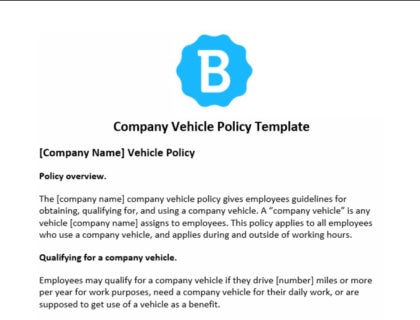
Downloadable Company Vehicle Policy
Download this free company vehicle policy template and tailor it to your company's needs. Instant download, no email required.
Download PolicyHow to Calculate Company Vehicle Personal Use:
When an employee uses a company vehicle for personal use it is considered a taxable fringe benefit. Personal use includes commuting to or from work, running errands, or allowing a spouse or family member to use the vehicle.
There are several ways to calculate personal use:
General valuation – This refers to the price the employee would pay to lease the vehicle for the same length of time in the same geographic location.
Annual lease valuation – Determine the fair market value of the vehicle by multiplying the annual lease value by the percentage of miles driven for personal use.
Cents-per-mile rule – Multiply the number of personal miles driven by the standard mileage rate of 70 cents per mile (as of 2025).
Commuting valuation – Determine the value of a vehicle by multiplying each one-way commute by $1.50.
For more information, refer to the IRS Employer's Tax Guide to Fringe Benefits.
Company Vehicle Policy Template
1. Driver policy overview.
The [company name] company vehicle policy gives employees guidelines for obtaining, qualifying for, and using a company vehicle. A “company vehicle” is any vehicle [company name] assigns to employees. This policy applies to all employees who use a company vehicle, and applies during and outside of working hours.
2. Qualifying for a company vehicle.
Employees may qualify for a company vehicle if they drive [number] miles or more per year for work purposes, need a company vehicle for their daily work, or are supposed to receive the use of a vehicle as a benefit.
If you have not been assigned a company vehicle and believe you need one, contact HR.
To be eligible for a company vehicle, employees must complete a form and submit a copy of their driver’s license. Employees are only allowed to drive a company car if they have a valid driver’s license and a clean driving record for at least [X years].
A clean driving record means the employee has not been held at fault for a car accident or arrested on charges of violating vehicle and traffic laws. [Company name] can assign and revoke access to company vehicles at its discretion.
3. Company vehicles for employees with disabilities.
[Company Name] will make reasonable accommodations to facilitate company vehicle use for eligible employees with disabilities.
4. Personal use.
[Company name] [does not allow/on a case-by-case basis allows] personal use of company vehicles. Personal use includes using the vehicle for personal errands between business activities, to commute between the workplace and home, or using the vehicle outside of business hours. [All work safety rules continue to apply when a company vehicle is used for personal purposes.]
5. Company driver rules.
- Obey traffic laws in your jurisdiction and be courteous toward other drivers.
- Document driving expenses.
- Monitor gas, tire pressure, and fluid levels.
- Report any damage or problems to your assigned vehicle immediately.
- Report changes to your driver privileges, such as driver’s license suspension, immediately.
- Always lock company cars.
- Bring vehicle to scheduled maintenance appointments.
- Do not drive while intoxicated, fatigued, or on medication that affects your driving ability.
- Do not smoke in any company vehicle.
- Do not lease, sell, or lend a company vehicle.
- Do not use a phone or text while driving.
- Do not allow unauthorized drivers to use a company vehicle unless required by an emergency.
Employees who violate company vehicle rules are subject to disciplinary actions which may include verbal and written warnings, suspension of vehicle privileges, termination and legal action.
6. Accident procedures.
In case of an accident, contact the HR department immediately. They will contact the insurance provider. Follow legal guidelines for exchanging information with other drivers and report the accident to local police if required. Do not guarantee a payment or accept responsibility without company authorization.
7. The company's responsibilities.
- Ensuring vehicles are safe before assigning them.
- Scheduling regular maintenance.
- Providing car insurance.
- Retiring and replacing cars as needed.
8. What the company is not responsible for.
- Paying fines that employees receive while driving company vehicles they are responsible for.
- Posting bail for employees who are arrested while driving cars from the company fleet.


